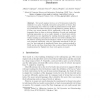Free Online Productivity Tools
i2Speak
i2Symbol
i2OCR
iTex2Img
iWeb2Print
iWeb2Shot
i2Type
iPdf2Split
iPdf2Merge
i2Bopomofo
i2Arabic
i2Style
i2Image
i2PDF
iLatex2Rtf
Sci2ools
109
click to vote
ESA
2010
Springer
2010
Springer
Top-k Ranked Document Search in General Text Databases
Text search engines return a set of k documents ranked by similarity to a query. Typically, documents and queries are drawn from natural language text, which can readily be partitioned into words, allowing optimizations of data structures and algorithms for ranking. However, in many new search domains (DNA, multimedia, OCR texts, Far East languages) there is often no obvious definition of words and traditional indexing approaches are not so easily adapted, or break down entirely. We present two new algorithms for ranking documents against a query without making any assumptions on the structure of the underlying text. We build on existing theoretical techniques, which we have implemented and compared empirically with new approaches introduced in this paper. Our best approach is significantly faster than existing methods in RAM, and is even three times faster than a state-of-the-art inverted file implementation for English text when word queries are issued.
Related Content
| Added | 09 Nov 2010 |
| Updated | 09 Nov 2010 |
| Type | Conference |
| Year | 2010 |
| Where | ESA |
| Authors | J. Shane Culpepper, Gonzalo Navarro, Simon J. Puglisi, Andrew Turpin |
Comments (0)

